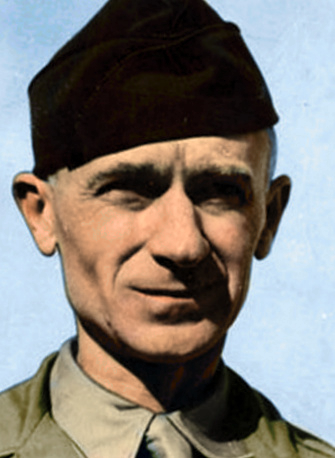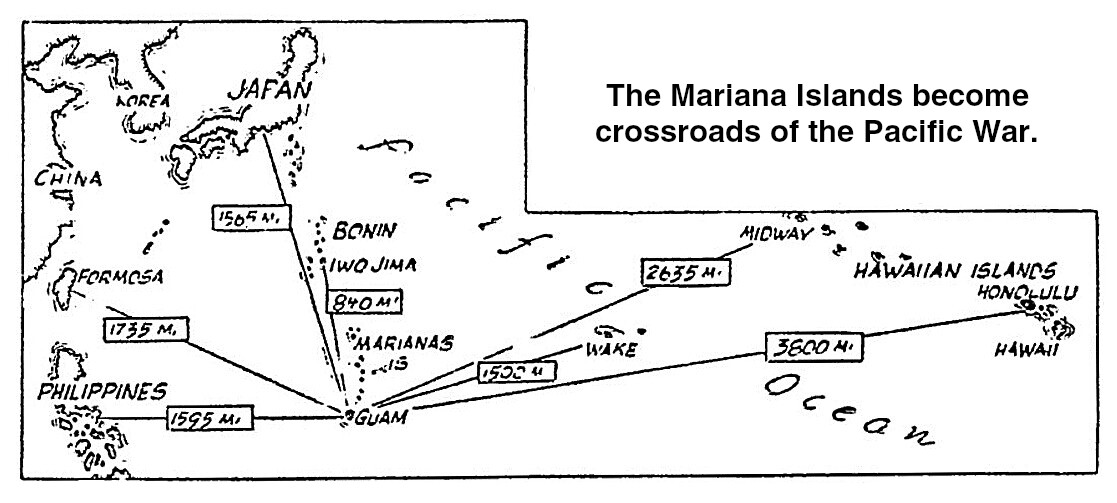The Pittsburgh Press (February 21, 1945)

By Ernie Pyle
EDITOR’S NOTE: Ernie Pyle is now on an aircraft carrier and apparently participated in one of the big actions that have been going on in the Pacific. However, no direct reports have come back yet and meanwhile his articles are telling of his trip to the new assignment.
IN THE MARIANA ISLANDS – It is tropical where we are now, wonderfully tropical.
It looks tropical, and best of all, it feels tropical. Just now is the good season, and it is like the pleasantest part of summer at home.
But it is hotter than you think, and you change your whole approach to the weather here.
You get from the Navy a long-billed “baseball” cap to shield your eyes from the sun. your clothes closet has an electric light burning constantly in it, to keep it dry so your clothes won’t mold. You change your leather wristwatch strap to a canvas one, for a leather one would mold on your arm.
You put on heavy high-topped shoes again, for it still rains some and the red mud is sloppy. And instead of light socks for coolness as you’d think, you put on heavy socks to help cushion your feet in the big shoes, and to absorb the moisture.
Officers wear their sunglass cases hooked to their belts. Ties are unknown. There is no glass in the windows. Wide slanting caves jut out fat beyond the windows in all the permanent barracks buildings, fore when it rains here it really pours.
Horizontal rain
And as someone said, it rains “horizontally” here. In the few showers since we arrived, I’ve seen that the rain does come at quite an angle.
Actually, the rainy season is supposed to be over. Consequently, every time it showers during the day, the Californians in camp point out that the weather is “unusual.”
Lt. Cmdr. Max Miller and I are staying briefly in a room of a bachelor officers quarters – or BOQ. Our famous Seabees have put them up all over these various islands since we took over from the Japanese last summer.
They are in the curved form of immense Quonset huts, made of corrugated metal and with concrete floors. Some of them are even two-storied. They have a wide hall down the center, and individual rooms on each side. The walls are cream-colored.
Wonderful beds
The outside wall is almost all window, to let lots of air in. The spaces are screened but have no glass, for it never gets so cold you’d want to shut the window. But it is pleasantly cool at night, and we sleep under one blanket.
Each room has a clothes closet and a washstand and a chest of drawers. And also two beds. These beds are the talk of the Marianas.
They are American beds, with double mattresses, soft and wonderful. As everybody says, they’re finer beds than you’d have at home. I ran into one Army officer who had served in Europe, and he laughed and said, “After the way we roughed it there, I feel self-conscious about sleeping like this over here. But if the Navy wants to send over these beds, I’m sure as hell going to sleep in them.”
The great working camps of the Seabees and the troops are largely of tents, with ordinary cots in them. But on the whole, now that we have been improving the islands for several months, everybody lives pretty comfortably.
Reception committee
Max and I had a reception committee when we walked into our room.
A half dozen Seabees were throwing old lumber into a truck just outside our window. We hadn’t been in the room two seconds until one Seabee called through the window: “Say, aren’t you Ernie Pyle?”
I said right, and he said “whoever thought we’d meet you here? I recognized you from your picture.” And all the others stopped work and gathered outside the window while we talked through the screen.
The Navy furnishes orderlies for these rooms, to keep them clean. Mostly they are colored boys, regular enlisted men. Pretty soon our orderly walked in, and he started staring at me and I at him, for he sure looked familiar.
Together on invasion
He was a great tall fellow, and he grinned and we shook hands, for we had been on the same ship together when we invaded Sicily a year and a half ago.
He was a table waiter then. His name is Elijah Scott, his home is in Detroit, and he’s a steward’s mate second class. He was on the other side of the world nearly a year, spent eight months in America, and now here he is over here, almost as newly arrived as I am.
And that isn’t all. Within half an hour after we arrived, there was a knock on the door and in walked an Army major with a big grin. “Well,” he said, “I see you haven’t got any fatter since the old days in Sicily and Italy.”
He was Maj. Peter Eldred of Tucson, Arizona. A year and a half ago, he was public relations officer for the Seventh Army in Sicily. Now he’s a press censor in the middle of the Western Pacific, sitting on my bed talking about what used to be.
Sometimes the world gets almost ridiculous in being so small after all. I’m expecting my father and Aunt Mary to climb through the window here any minute now.



